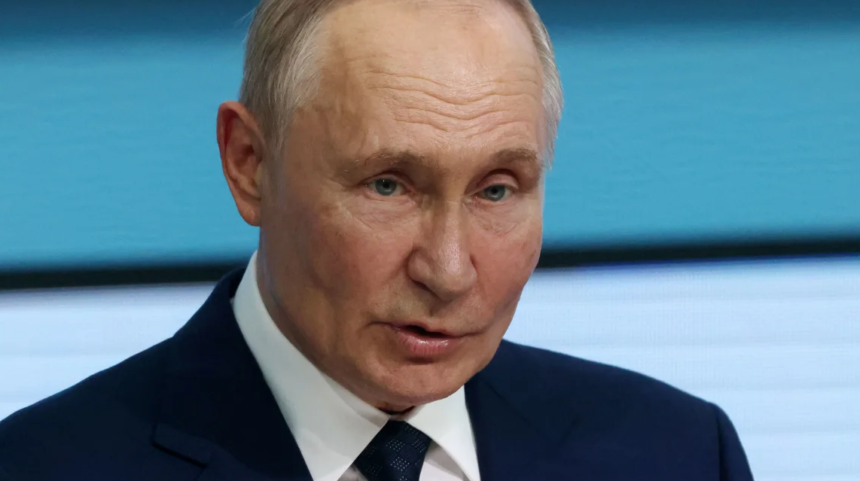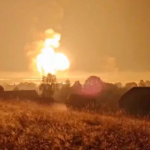The president of Russia, Vladimir Putin, has threatened the leaders of the NATO alliance with war, saying that removing constraints from Ukraine on longer-range Western missiles to strike deep into his territory would be considered an act of war.
That would mean NATO members, the US, and other European countries at war with Russia. If this is so, we will respond appropriately to all hazards posed to us by considering the change of the conflict’s essential nature, Putin told reporters on Thursday.
Putin’s comments come at a time when the US and NATO allies are increasingly open to allowing Ukrainian forces to conduct strikes against Russian military targets using long-range weapons systems provided by the West, as the government in Kyiv has loudly sought this capability as the war grinds into its second year.
The strongest encouragement has come from a recent visit by US Secretary of State Antony Blinken to Kyiv. Still, the White House considered relaxing restrictions in line with more general strategic realignment among NATO allies.
Blinken spoke alongside British Foreign Secretary David Lammy and Ukrainian Foreign Minister Andrii Sybiha. “From day one, as you heard me say, we have adjusted and adapted as needs have changed, as the battlefield has changed, and I have no doubt that we’ll continue to do that as this evolves,” Blinken said.
UK Prime Minister Keir Starmer arrived in Washington on Friday for talks with US President Joe Biden, as Western weapons are deployed against Russian targets for the first time.
Although the U.S. has adjusted its approach to allow limited cross-border strikes into Russia with U.S.-provided armaments, President Joe Biden has not yet cleared longer-range hardware. U.S. officials have already expressed concerns that the war would escalate if they allow Ukraine to strike deep inside Russia.
Those talks came just after Russia’s security service, the FSB, withdrew credentials from six British diplomats in Moscow and accused them of espionage, unsupported by any documentation. Later, Britain reported that the expulsion occurred a month ago, calling the claims “completely baseless.”
Both Democrats and Republicans in Congress are pushing Biden to roll back the restrictions at home as Ukraine works to lock in its military gains and risks being pushed back by the withdrawing Russian army.
The bipartisan congressional Ukraine caucus urged Biden on Tuesday to permit Ukraine to use its long-range weapons to strike targets within Russia.
Before Blinken’s trip to Ukraine, a group of influential House Republicans also sent a letter to the president this week, the second in recent days- renewing Volodymyr Zelensky’s demands that the caps be removed.
But on Thursday, Putin questioned whether Kyiv could carry out long-range strikes without outside help. “The Ukrainian army is incapable of using advanced high-precision long-range systems supplied by the West due to the absence of targeting support from NATO,” he said.
Though not with the long-range systems now under consideration, the US military has already helped target and provide intelligence to Ukraine.
According to Dr Stacie Pettyjohn, a senior fellow at the Center for a New American Security, Ukrainian troops could also access commercial satellite images depending on the target.
At the news conference on Thursday, Blinken reiterated that the US has continued to provide intelligence to the Ukrainian forces as part of its military assistance to the country but would not say more about whether or not the US will share more intelligence.
To questions about the risks of escalation on Wednesday, Blinken replied that they were a factor but “certainly not the only factor, and it’s not necessarily a dispositive factor.”
They also accused Russia of having already escalated by acquiring Iranian ballistic missiles.
“It would appear that Mr. Putin and Russia are taking escalatory action, as we’ve now seen in the form of Russia acquiring ballistic missiles from Iran which it will use to further its aggression against Ukraine,” Blinken said.
UN Secretary-General spokesman Stephane Dujarric warned on Friday of “increasing rhetoric” related to nuclear weapons after the Russian ambassador to the UN repeated Putin’s comments and referred to Russia’s nuclear arsenal. Ambassador Vasily Nebenzya made the following threat in his Friday address to the UN Security Council: “The facts are that NATO will be a direct party to hostilities against a nuclear power.” I believe you should consider the repercussions and not ignore this.
In October 2023, the US first supplied Ukraine with long-range Army Tactical Missile System (ATACMS) missiles. The missiles have a maximum range of about 180 miles and 290 kilometres. Kyiv has urged its supporters in the West to permit the deployment of weaponry that would extend its reach into Russian territory for an extended period.
Recently, Rustem Umerov, minister of defence for Ukraine, told CNN’s Alex Marquardt in an interview that deep attacks could reach the airfields Russia uses to attack Ukrainian cities. So far, Ukraine has used its supply of long-range ATACMS on high-value Russian assets in occupied Crimea, including air defences and ammunition depots, as well as airfields.
Former US ambassador William Courtney, now an adjunct senior fellow at the RAND Corporation, told CNN that if NATO nations proceed with approving the use of Western weapons to strike long-range inside of Russian territory, then this technology might be extended for targeting close-range ballistic missile systems that have recently arrived in the country from Iran. A US-made ATACMS-type system “could hit anything at that distance and well beyond,” he told CNN.















